Vietnam is calling you!
With its jagged mountains, hypnotically green rice terraces, and the promise of unforgettable encounters, every trekker dreams of exploring the Land of the Ascending Dragon. As you pack your bag, a crucial question arises: should you hire a guide or set out as a lone explorer?
The short answer is: Yes, but rarely everywhere, and never without preparation. Solo adventure is possible, but it comes with conditions. Far from old myths of insecurity, the real challenge here is navigating nature, the terrain, and the language barrier.
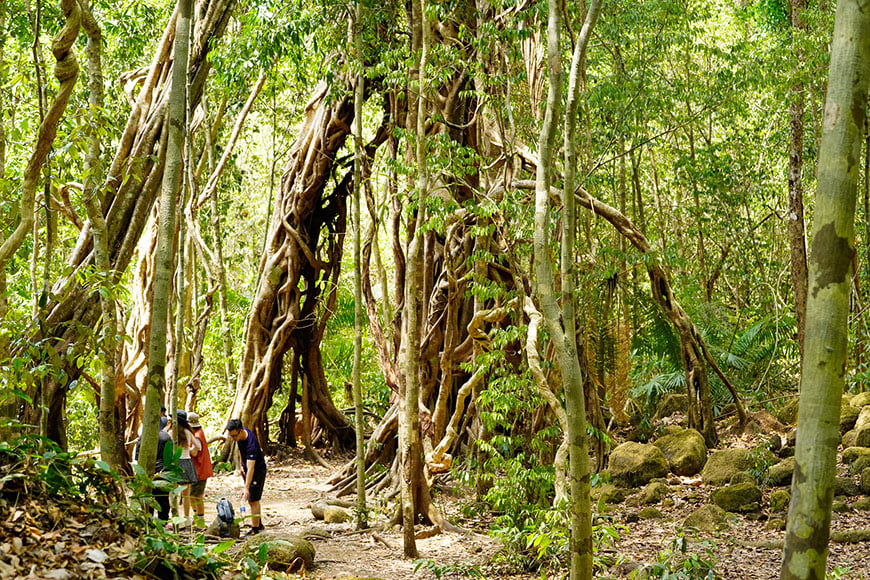 Many National Parks offer well-marked or clearly indicated trails | Mr Linh's Adventures
Many National Parks offer well-marked or clearly indicated trails | Mr Linh's AdventuresWhat is allowed without a guide
If you are an experienced hiker who values independence, certain areas welcome you without strictly requiring a professional guide.
Sapa: The accessible classic
Sapa is your starting point for autonomy. The famous Muong Hoa Valley (around the villages of Lao Chai and Ta Van) is a perfect "training ground". The trails here are well-trodden from years of use by locals and tourists.
National Parks and short hikes
Many
National Parks offer loops that take just a few hours. These interpretive trails are often well-marked or clearly indicated, and their difficulty is moderate. This is the ideal opportunity to test your gear and navigation skills without excessive pressure.
 Experience the magic of Ba Bể National Park at night on a guided trek | Mr Linh's Adventures
Experience the magic of Ba Bể National Park at night on a guided trek | Mr Linh's AdventuresA few examples of accessible trails
Ba Bể (North) or Cát Bà (in Ha Long/Lan Ha Bay: certain sections within the National Park).
Cúc Phương (Ninh Bình) and its marked 3–10 km loops around the visitor center.
Pu Luong (Thanh Hóa), in the nature reserve, where village paths are often visible.
Bach Ma (Huế) with the 5 Do waterfall trail and the summit loop (2–6 km).
Keep in mind: Even if orientation is easy, caution is still necessary. If you venture off the main loops, the path often fades into rice paddies or bamboo groves. Your offline GPS map must be your best friend!
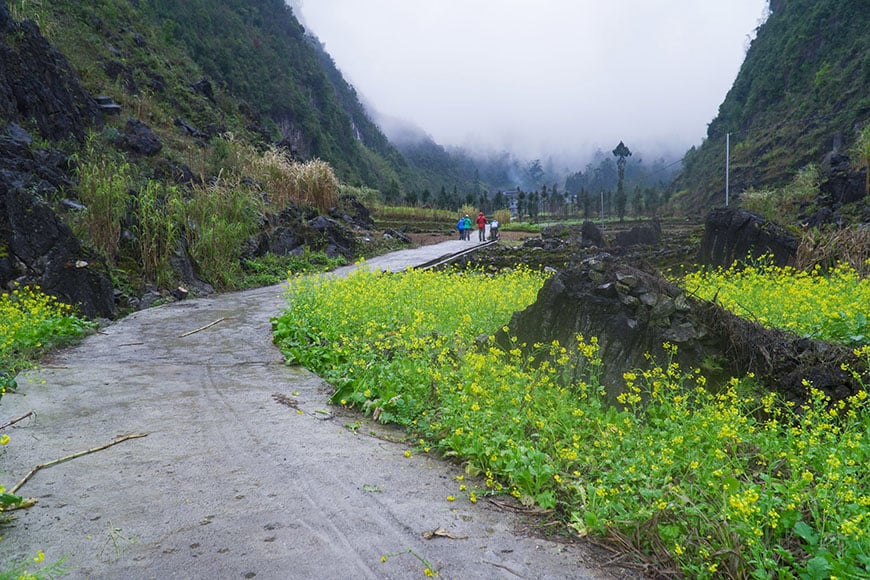 At altitude, the fog is unpredictable | Mr Linh's Adventures
At altitude, the fog is unpredictable | Mr Linh's AdventuresTechnically demanding and logistically complex destinations
Places like Mu Cang Chai, the Dong Van Geopark, the Pu Luong nature reserve, or Hoang Su Phi – not to mention the famous Ha Giang Loop – are very popular today. Although you are no longer the only tourists, a guide's assistance remains invaluable for optimizing the experience.
Culture and terrain reality
In the Land of the Two Deltas, the ground is a permanent challenge: after the rain, trails turn into rivers of mud. Descents on limestone or karst terrains without walking poles are miserable, even a risk of injury. In regions like Ha Giang or Mu Cang Chai, fog can envelop you in minutes, making orientation almost impossible. There are no signs. Only the guide, who has walked these paths since childhood, knows the buffalo trails and the shortcuts through the jungle.
Trekking in Vietnam is as much a physical adventure as it is a human encounter. For a multi-day trek with an overnight homestay, your local guide is the key that opens the doors to homes and sincere exchanges with minorities (Hmong, Dao...), as English (and even standard Vietnamese) is often unknown.
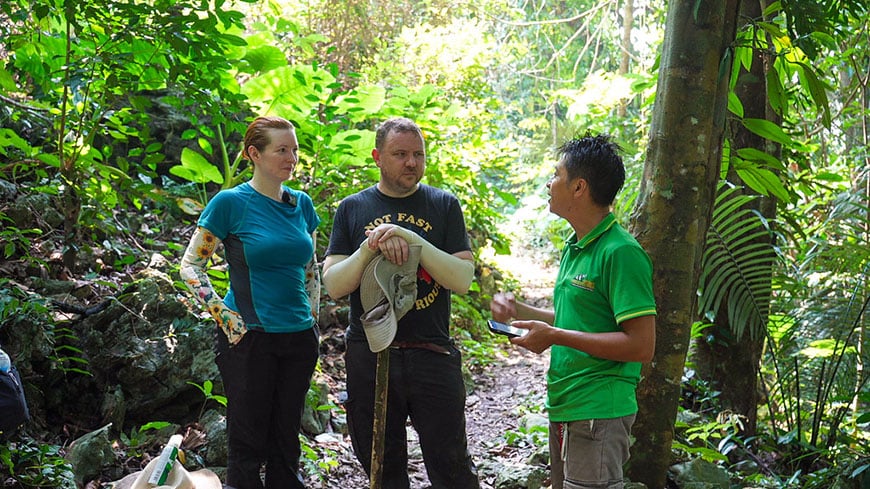 Only a local guide knows how to share their knowledge of the area | Mr Linh's Adventures
Only a local guide knows how to share their knowledge of the area | Mr Linh's AdventuresBeyond the hike: Jungle exploration
For sites like Ba Bể National Park, there's an important distinction: walks around the lake and in the villages are easy, but for a more intense and authentic trek (including several days in the jungle and encounters with the H'mong or Dao), an experienced local guide is necessary.
The added value of a guide
The guide leads you on paths that offer the best viewpoints, often hidden from main roads. These treks involve long ascents and descents, often on unstable ground. Local knowledge of the safest route is a major asset for avoiding mishaps.
So, don't be fooled by the marketing label "off the beaten track": while the logistics of your trip may be the gateway to adventure, the guide is often the key to authenticity and enjoyment.
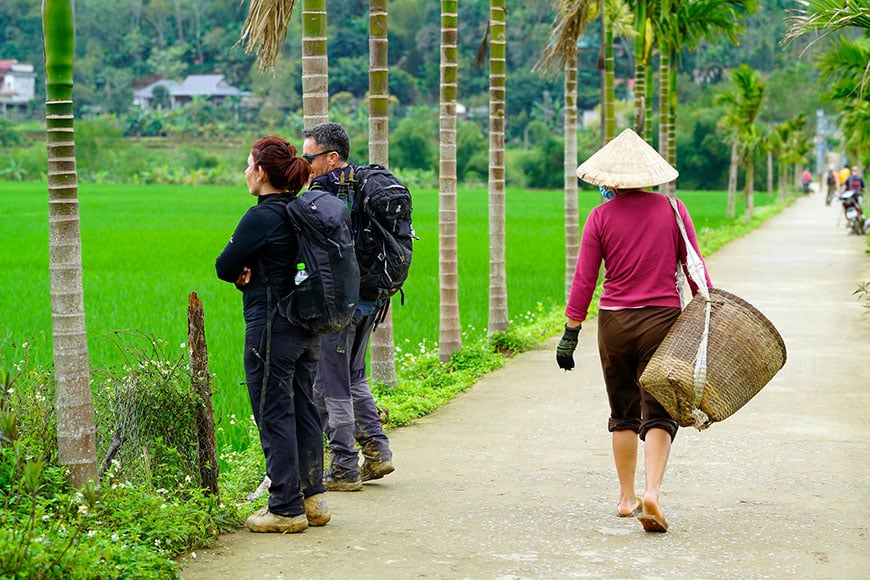 Pu Luong, a paradise for hikers | Mr Linh's Adventures
Pu Luong, a paradise for hikers | Mr Linh's AdventuresWhat is forbidden or highly discouraged solo
As soon as you look up towards the misty peaks and leave the easy walking trails, the guide stops being an option and becomes a necessity for safety and culture.
The Fansipan Massif (Sapa)
The classic trail (Tram Ton – 3143 m) has been officially prohibited without a guide since 2016 (by decree of Hoàng Liên National Park). Checks are carried out at the trail entrance, with fines. You could try a "grey" alternative that takes you through a military zone and private rice paddies, but you risk being turned back or getting lost in the fog.
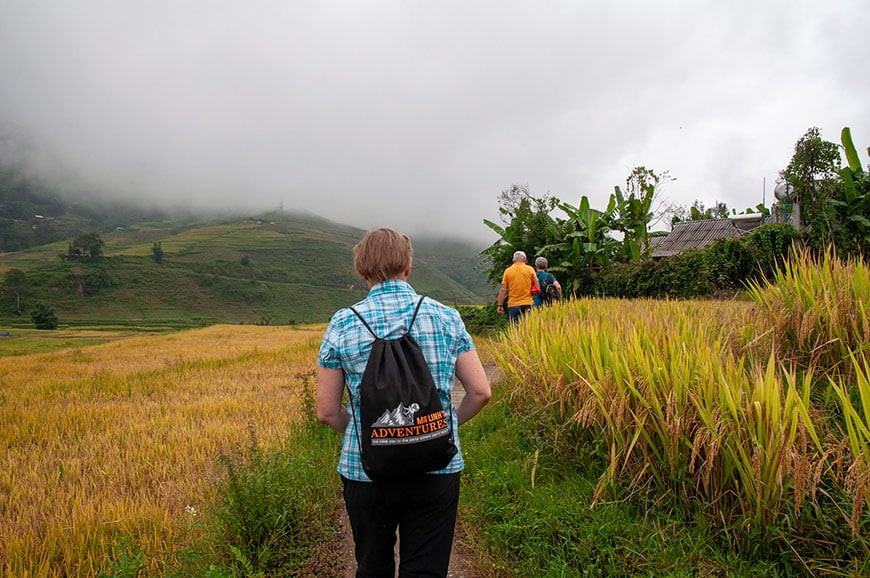 Hiking is also a seasonal affair | Mr Linh's Adventures
Hiking is also a seasonal affair | Mr Linh's AdventuresRegulated zones and real risks
Border Zones (Lao Cai, Lai Châu, Kon Tum)
Any military perimeter requires an identity card, a permit, and makes a guide mandatory.
Ha Giang (Dong Van, Ma Pi Leng, Meo Vac)
Hiking alone outside the villages means no signage, no GSM signal, 800m cliffs without guardrails, and frequent rockfalls (January–March). Rescue is slow to arrive (4–6 hours).
Cao Bằng
A spectacular and still relatively unknown region. The secondary jungle is very dense, and the absence of any indication is total. While hiking alone is possible, the need for a guide for safety and orientation in this area is very real.
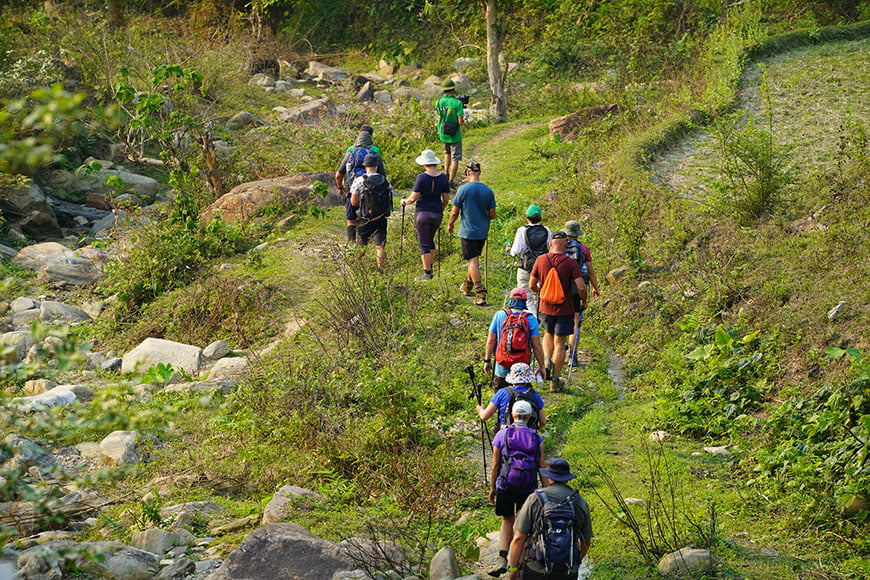 Walking pole, a must-have on slipery terrain | Mr Linh's Adventures
Walking pole, a must-have on slipery terrain | Mr Linh's AdventuresEssential gear for the prepared explorer
Whether you choose autonomy or a guided experience, set out prepared:
- Walking Poles: Truly essential on slippery terrain.
- Clothing: Think "onion"! Layer up with light clothing, as the climate is humid, days are hot, but nights at altitude are cold.
- Local SIM Card: A good 4G card is essential for emergency communication or checking a GPS track, despite white zones.
- Seasonality: Aim for March–May or September–November for the best balance between good weather and pleasant temperatures.
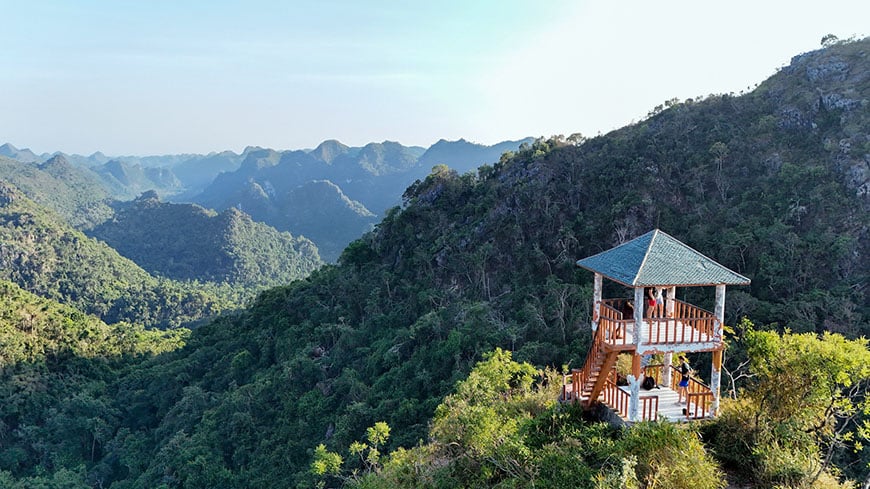 Ngu Lam Peak, a challenge in Cat Ba National Park | Mr Linh's Adventures
Ngu Lam Peak, a challenge in Cat Ba National Park | Mr Linh's AdventuresThe adventure is your choice
So, guide or no guide?
If you're doing a short loop of a few hours or exploring marked National Park trails, go for it, enjoy! But if your dream is long, deep treks, overnight homestays, and an authentic cultural immersion in regions where nature quickly takes back its rights, then trust a local guide.
In Vietnam, the guide is not a luxury, nor a strict legal obligation in most cases, but an enabler of adventure and encounters. They transform a potentially stressful journey into a smooth and rich experience.
Because ultimately, the greatest danger in Vietnam is not getting lost in the mountains, it's missing out on the human beauty of the trip.